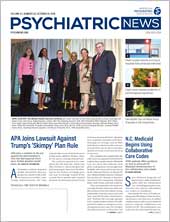As part of my overall commitment to creating an environment of diversity and inclusion in APA and the profession of psychiatry, this column is devoted to providing an update on the work of one member and two APA components regarding the education and training of future psychiatrists, our members, and the patients we serve.
In the fall of 2017, Francis Lu, M.D., initiated an action item advocating for a diversity/inclusion accreditation standard in graduate medical education. This action item addressed the Accreditation Council of Graduate Medical Education (ACGME) revised Common Program Requirements (CPR) for both residency and fellowship that were released June 29 and
will go into effect on July 1, 2019. Supported by both the Council on Minority Mental Health and Health Disparities and the Council on Medical Education and Lifelong Learning, the APA Board voted to lead this effort, joining other organizations including the Association of American Medical Colleges (AAMC) and the American Association of Directors of Psychiatric Residency Training (AADPRT), in advocating for this new accreditation standard. Until now, ACGME has had no diversity/inclusion accreditation standard. This action closes the gap between the 2009 LCME accreditation standard on diversity/inclusion for U.S. and Canadian medical schools and the ACGME accreditation standards for all residencies and subspecialty fellowships in the United States.
The specific diversity/inclusion requirement is included under “Oversight” and appears on page 5 of both the residency and fellowship CPR documents, as follows:
"I.C. The program, in partnership with its Sponsoring Institution, must engage in practices that focus on mission-driven, ongoing, systematic recruitment and retention of a diverse and inclusive workforce of residents, fellows (if present), faculty members, senior administrative staff members, and other relevant members of its academic community.
Background and Intent: It is expected that the Sponsoring Institution has, and that programs will implement, policies and procedures related to recruitment and retention of minorities underrepresented in medicine and medical leadership in accordance with the Sponsoring Institution’s mission and aims. The program’s annual evaluation must include an assessment of the program’s efforts to recruit and retain a diverse workforce, as noted in V.C.1.c).(5).(c).”
I encourage leaders in psychiatry’s residency and fellowship programs to prepare by partnering and aligning with their sponsoring institution’s relevant policies and procedures and, when institutional improvement is needed, contributing their expertise. Training programs should also consider working with the designated institutional officer (DIO), associate or assistant deans of diversity and inclusion, the chief diversity officer, and designated institutional officers of the AAMC’s Group on Diversity and Inclusion (GDI) and Group of Women in Medicine and Science (GWIMS).
Finally, departments of psychiatry should create an internal diversity advisory committee, chaired by a senior faculty member who has received training or with experience in the area of diversity and inclusion and reports directly to the department chair. That individual must be charged with developing and implementing policies and procedures of recruitment and retention for a diverse and inclusive workforce of trainees, faculty, and staff. This advisory committee should work closely with other GME programs and faculty search committees to establish guidelines to ensure diverse and inclusive recruitment on residency and fellowship selection committees and faculty search committees, including internal support systems to assure they are successful in their work. The identification and development of needed supports (including the appropriate mechanisms for expressing and addressing concerns, complaints, and challenges) is critical to the recruitment and retention of a diverse and inclusive workforce in psychiatry and the rest of medicine. By adopting these practices, we assure that the field moves closer to the goal of recruitment and retention of a diverse and inclusive workforce of residents, fellows, faculty members, key administrative staff, and other relevant members of the medical academic community.
Let me hear from you on how the APA can help! ■
Thanks to Drs. Francis Lu and Mary Kay Smith for their suggestions and assistance in writing this column.

